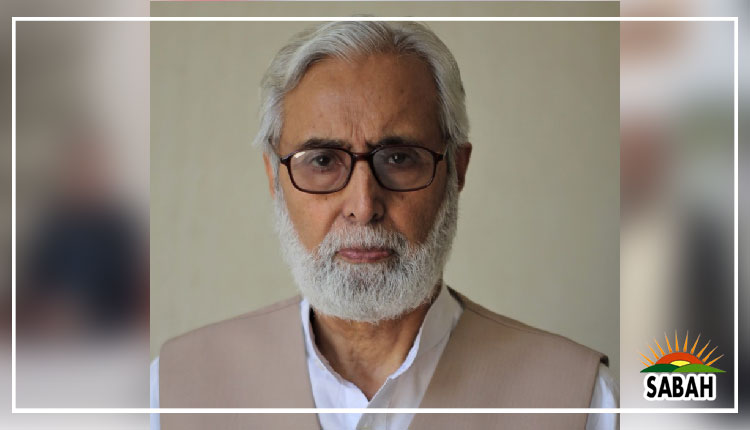Law did not allow land meant for defence purposes to be used for commercial gains: CJP Gulzar Ahmed
ISLAMABAD, Nov 30 (SABAH): Chief Justice of Pakistan (CJP) Justice Gulzar Ahmed on Tuesday said that the law did not allow land meant for defence purposes to be used for commercial gains, saying such land should be returned to the government once its strategic use has ended.
A three-judge bench headed by the chief justice and comprising Justice Qazi Muhammad Amin Ahmed and Justice Ijazul Ahsan resumed the hearing on the issue of military lands being used for commercial purposes.
As the hearing got under way, the chief justice again grilled Defence Secretary retired Lt Gen Mian Mohammad Hilal Hussain over commercial establishments being built on military land.
“The law’s intention is not that defence land is used for any other purpose,” Justice Gulzar Ahmed reiterated. “If [the land] is not being used for defence then it will go back to the government.”
“This is government land,” the top judge said, noting that cinemas, petrol pumps, housing societies, shopping malls and marriage halls were being constructed on land meant for defence.
“General sahib, these are not defence purposes,” he told the defence secretary, asking the attorney general to explain how the defence ministry would “limit the land’s use to defence”.
The court said it would interpret the law concerning the land of cantonment boards in light of the Constitution, with Justice Amin remaking: “This is also very important for the institution’s own reputation.”
The CJP then turned to the attorney general, saying “They must be made to understand the law, who will do that?”
He said a retired major had given the land of Global Marquees, a wedding venue near Gora Qabristan, on lease to a private party, and asked whether he had the authority to do so.
The CJP expressed dissatisfaction over a report submitted by the defence secretary regarding the case, saying the report “claims the [illegally built] buildings have been demolished, but they are still there”.
The defence secretary responded that he would visit the sites in person and take pictures to compile a new report.
“This situation is a cause of embarrassment for the army and us both,” CJP Ahmed remarked, following which the attorney general offered to withdraw the report submitted today.
The court directed him to submit a detailed report within four weeks, identifying the purposes of each piece of cantonment land.
“Under the law, strategic land will only be used for defence purposes,” the CJP told the defence secretary.
The secretary informed the court that the scope of the term “strategic objectives” was “wide”, saying commercial activities also fell into the category of “strategic defence”.
“Whenever the army goes to the borders, these activities are carried out for the purpose of welfare and to keep the morale of the army high,” Hussain explained.
At this, the CJP said: “Secretary sahib everything is fine, but where is the cantonment there? All we can see there are houses.”
Justice Ahmed pointed out that schools and marriage halls had also been built on Faisal Base land.
“It is being said that Masroor and Korangi airbases are being shut and [perhaps] commercial activities will be started there,” the CJP added.
He noted that cantonment land had to be returned to the government after defence objectives were met.
The court observed that strategic lands can only be used for defence purposes as per the law, and directed the defence secretary to submit a report within four months.
Addressing the attorney general, CJP Ahmed inquired how would he restrict the use of military lands for defence purposes only.
During the hearing, the defence secretary asked for permission to speak and said: “The scope of the term strategic objectives is wide and commercial activities also fall under the strategic defence. These activities are meant to keep the armed forces’ morale high.”
“You are saying that commercial use is [fulfillment of] defence objectives. What is defence then?” CJP Ahmed asked while addressing the defence secretary.
He said that cinemas, petrol pumps, housing societies, marriage halls and shopping centres “are not defence-related objectives”.
“This is the government’s land and it will go back to the government if it is not used for defence purposes,” the CJP added.
The CJP added that laws under which the Pakistan Army engages in commercial activities are “unconstitutional” and questioned, “how can the army even conduct commercial activities on state land?”
Justice Ahmed said that it is “not possible to allow the army’s illegal constructions to stand”.
The chief justice noted that all illegal buildings are being demolished in Karachi and noted that large walls have been erected on Karsaz road and the service road has been pushed further away from the road.
“If we let these remain, how will we demolish other buildings and structures?” he remarked.
He said cantonment land cannot be divided into different categories.
Justice Ahmed remarked that the Pearl Marquee and Grand Convention Hall are still standing.
“The wall running alongside the Kala Pul and the Grand Convention Hall must be knocked down today,” he said.
“Large walls have been constructed on Karsaz and Rashid Minhas road for advertisements. This is state’s land,” he added.
Justice Ahmed said this practice is “found on cantonment board lands all over the country”.
“CSD has also been made an open, commercial department store,” he said.
“A building was erected on Gizri Road overnight. We had barely woken up in the morning and they constructed the building,” he continued.
The chief justice then asked the defence secretary what his plans ahead are, to which the secretary responded by saying that a committee of all the three military services has been formed which will identify illegal constructions.
“The army should not compromise on its bigger objectives for petty business,” Justice Qazi Amin remarked, adding that the military should be mindful of the sanctity of its institution.
CJP Ahmed pointed out that shopping malls had also been built on defence land in Lahore and Quetta, saying “it is not clear how the Ministry of Defence will sustain these activities.”
The defence secretary informed the court that a joint committee of all three armed forces had been formed to check violations of the law.
The CJP further said that “allotting houses to senior army officers does not fall under defence purposes.”
“How can the army carry out commercial activities on state land?” he questioned, emphasising that state land should not be “exploited”. The apex court while approving the request of the Attorney General Barrister khalid Jawed Khan to take back the report submitted by secretary defence has directed the secretary defence to submit implementation report in four weeks time and adjourned the further hearing of the case for one month.












